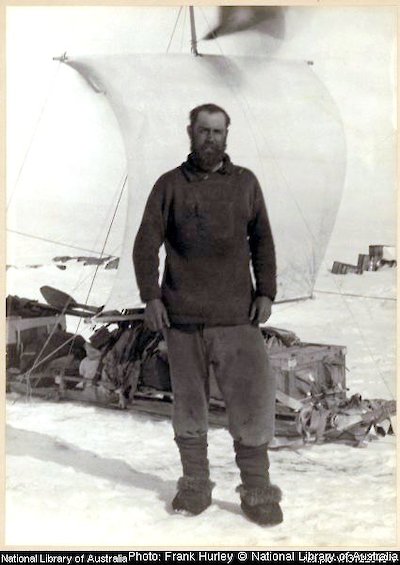Morton Henry Moyes
AAE position: Meteorologist
Moyes was born in 1886 in Koolunga, South Australia. As a science graduate from the University of Adelaide, he came to the attention of Douglas Mawson who selected him to join the AAE, mainly to acted as meteorologist for the Western Party under Frank Wild.
Moyes took part in several sledging journeys in the autumn and spring of 1912, but he is most remembered for staying at home in late spring 1912. Moyes endured nine weeks as sole occupant of the winter quarters on Shackleton Ice Shelf all the rest of the men sledging. The loss of a sled delayed the group’s return, adding to Moyes’s anxiety.
After returning to Australia, Moyes became a teacher — at first as headmaster of the University Coaching College and from early 1914 a naval instructor at the newly established Royal Australian Naval College, specialising in mathematics and navigation.
In 1916 he was appointed to Aurora’s complement as navigating officer, under the command of JK Davis, which sailed from New Zealand to the Ross Sea in December to rescue marooned members of Shackleton’s Trans-Antarctic Expedition.
After a frustrating period in which he unsuccessfully sought war service (rejected because the Navy thought his skills were too important), Moyes resigned from the Navy and married Miriam Esther King in 1919. He rejoined the Navy in the same year and was finally promoted to ‘Instructor-Commander’ in 1924.
Moyes’s navigation and survey skills and experience were further recognised by Mawson in September 1929, when Moyes, on secondment from the Navy, became survey officer for the first voyage of the British, Australian and New Zealand Antarctic Research Expedition.
Captain JK Davis rejected Moyes as a ship’s officer for the expedition because he thought he was not properly trained, but Mawson made good use of his scientific skills in various surveying and recording tasks. His fellow-expeditioners found him a conscientious worker and a steadying influence during the difficult voyage.
Moyes’s naval career included six years as fleet instructor officer and promotion to instructor captain in June 1941. Again he was barred from war service, this time because of age as well as seniority. In November 1943 he became the first director of educational and vocational training at Navy Office, Melbourne. The end of his naval career in 1946 saw his appointment as chief Commonwealth rehabilitation officer, supervising post-war training for thousands of ex-servicemen and women.
During his long retirement, Moyes enjoyed some public recognition as one of the last veterans of the ‘heroic age’ of Antarctic exploration. He died in 1981.

